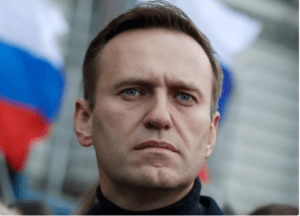The Enigmatic Disappearance and Rediscovery of Alexei Navalny: A Chilling Tale of Isolation and Power

In a dramatic turn of events, Alexei Navalny, the prominent Russian opposition leader and fierce critic of President Vladimir Putin, has been found after weeks of mysterious disappearance. Navalny’s associates revealed the startling news on Monday, raising concerns about the state of dissent and human rights in Russia.
Navalny, who is serving a 19-year sentence on charges of extremism, had been held in a prison in the Vladimir region, approximately 230 kilometers east of Moscow. However, contact with him was abruptly lost on December 6, leaving his legal team and supporters in a state of anxiety. His spokesperson, Kira Yarmysh, disclosed on social media platform X (formerly Twitter) that Navalny had been located in a prison colony in the town of Kharp, situated in the Yamalo-Nenetsk region, nearly 1,900 kilometers northeast of Moscow. This remote location is infamous for its harsh winters and is near Vorkuta, known for its brutal coal mines that were part of the Soviet Gulag prison camp system.
The revelation of Navalny’s whereabouts came as a shock to many, considering the extreme isolation and secrecy surrounding the prison colony. Leonid Volkov, Navalny’s chief strategist, emphasized the difficulty of accessing the colony, stating, “It is almost impossible to get to this colony; it is almost impossible to even send letters there. This is the highest possible level of isolation from the world.” The circumstances surrounding Navalny’s transfer and the lack of communication fuel concerns about the transparency and accountability of Russia’s prison system.
The urgency of Navalny’s situation was exacerbated by reports of his deteriorating health and alleged denial of food, coupled with confinement in an unventilated cell. These alarming conditions raised fears among his supporters that he was deliberately hidden by authorities. The timing of Navalny’s disappearance also raised eyebrows, coinciding with President Putin’s announcement of his candidacy for Russia’s March presidential election.
Navalny’s supporters and other critics view the upcoming election as an opportunity to challenge Putin’s reign and draw attention to the Kremlin’s controversial actions, particularly its military involvement in Ukraine. Despite Putin’s virtually guaranteed reelection, owing to his dominance in Russian politics and the intensified crackdown on dissent, Navalny’s camp aims to leverage the campaign to erode public support for the incumbent leader.
The incident underscores the persistent challenges faced by opposition figures in Russia, where dissent is met with suppression and imprisonment. Navalny, known for his anti-corruption activism and vocal opposition to the Kremlin, has long been a thorn in Putin’s side. His imprisonment and the subsequent ordeal of disappearance only serve to highlight the lengths to which those in power will go to silence dissenting voices.
International reactions to Navalny’s disappearance and subsequent rediscovery have been mixed. Human rights organizations and foreign governments have expressed concern about the apparent lack of transparency in Russia’s prison system and the treatment of political prisoners. Calls for the release of Navalny and a thorough investigation into the circumstances surrounding his disappearance are gaining momentum on the global stage.
As the world watches, the enigmatic case of Alexei Navalny raises important questions about the state of democracy, human rights, and political dissent in Russia. The resilience of Navalny’s supporters, coupled with international pressure, may yet shape the narrative surrounding Putin’s leadership and the trajectory of Russia’s political landscape in the years to come.
Also Read: Remembering Neel Nanda: A Rising Star in Comedy Leaves Behind Laughter and Legacy